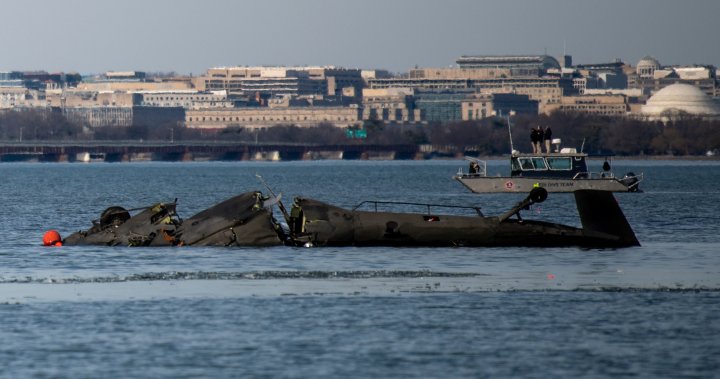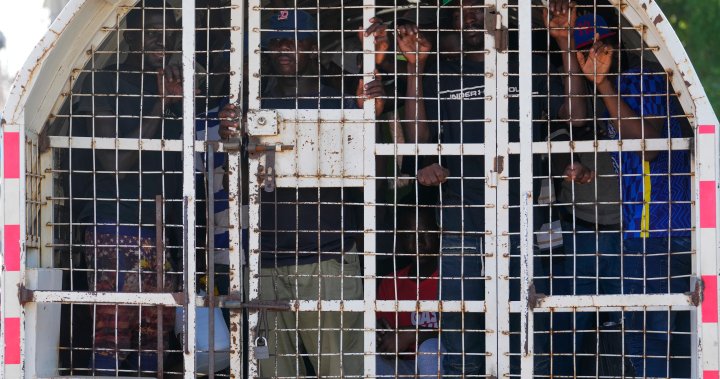The Dominican Republic announced Tuesday that it had deported or repatriated nearly 11,000 Haitians in the past week, fulfilling a pledge to do so weekly as neighboring Haiti struggles to cope with the influx while struggling with gang violence and poverty.
The Dominican government announced last week that it would deport up to 10,000 Haitians per week, citing an “increase” in the number of migrants as relations between the countries that share the island of Hispaniola remain strained. These are the largest deportations in recent history there.
The announcement prompted Haitian officials to call an emergency meeting at the Organization of American States, where Haiti’s Permanent Representative Gandhi Thomas called the deportations an “ethnic cleansing strategy” and “a discriminatory campaign against Haitians because of their nationality and skin color.” “
Thomas called for dialogue and a “respectable solution,” saying deportations “will exacerbate the fragility of our infrastructure while deportees will arrive without support, resources or connections to their community.”
Story continues below ad
At least half a million Haitians live in the Dominican Republic, according to human rights groups.
Activists say the deportations are putting the lives of thousands of people at risk. The UN-backed mission led by the Kenyan police, which began earlier this year to try to quell gang violence, is facing a shortage of funds and personnel.
“There are a large number of armed groups that are like birds of prey waiting to pounce on these people and take advantage of them,” said Sam Guillaume of the Haiti Support Group for Returnees and Refugees.

Trudeau calls for a “global effort” to support humanitarian needs in Haiti
Guillaume accused the Dominican authorities of “hunting down” Haitians, stressing that some of them are being blackmailed, raped, detained in prison without water or food, and subjected to beatings or tear gas “if they dare to boo.”

Get daily national news
Get the day’s top political, economic and current affairs news, headlines, delivered to your inbox once a day.
Radhavel Rodriguez, advisor to the OAS mission in the Dominican Republic, said the government rejects accusations of mistreatment and will take any complaint “seriously” and investigate it.
Story continues below ad
He said that the Haiti crisis disproportionately affects the Dominican Republic, stressing that migrants constitute a heavy burden on schools, clinics and hospitals.
Rodriguez said that his country stands in solidarity with the people of Haiti during their crisis, but added that no one can expect it to stop deportations.
Both Rodriguez and Thomas called for dialogue as officials in Haiti urgently met to talk about deportations and created a working group to deal with the influx of migrants and their needs.
“The forced and mass deportation of our Haitian citizens from the Dominican Republic is a violation of basic principles of human dignity,” Haitian Prime Minister Gary Connelly wrote on the X social media platform on Tuesday.
Mass deportations have increased the number of abandoned children across the Dominican Republic, warns activist William Charpentier, coordinator of the Dominican-based National Coalition for Migration and Refugees.
“They take their parents, or one parent, and leave the children behind, even while they are in school,” he said.
Charpentier described the deportations as “a kind of persecution against black people, against everything they assume to be Haiti.”

Haiti’s medical system is on the verge of collapse
He said that even people with legal documents are being detained and deported, a practice that activists say has occurred in previous years.
Story continues below ad
Allegations of extortion increased.
Osikel Batista, a 45-year-old Haitian migrant who sells avocados in the capital, Santo Domingo, accused soldiers of demanding $230 to $330 to avoid deportation “even when they have their papers in their hands,” she said of the migrants.
“We came here to work,” she said.
Luis Rafael Lee Ballestre, the Dominican Republic’s immigration director, said human rights are respected and force is used proportionately when migrants are arrested.
He said people with documents were detained because they did not have “reliable identification” to justify their presence in the country.
From October 1 to 7, 7,591 people were deported and 3,323 people were repatriated, according to the government, which said all were Haitians.
—Cotto reported from San Juan, Puerto Rico.
& Edition 2024 The Canadian Press

















